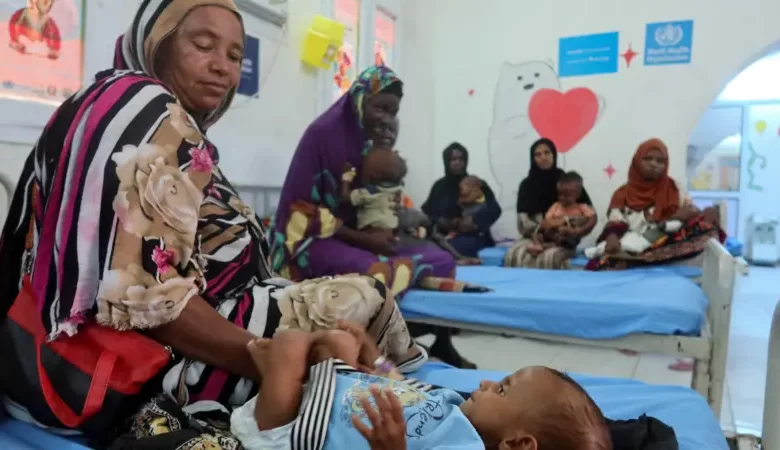Sudanese People Facing Cholera and War

Sudan is experiencing a catastrophic health crisis due to the outbreak of cholera, as the war enters its third year.
The Sudanese face a dire reality: alongside cholera, malaria and dengue fever are spreading amid a collapsing healthcare system.
Many Sudanese had just begun returning to the army after it regained control of the capital, Khartoum, only to now seek to flee again—especially after cholera began spreading in the capital and several other states.
The Sudanese Ministry of Health has declared the disease is spreading in North Kordofan, Sennar, Al Jazirah, White Nile, and River Nile states.
Mashaer Ahmed, who returned to Sudan about a month ago, lives in the Karari locality of Omdurman—an area with the highest cholera infection rates according to the Ministry of Health.
She told the BBC she came back after hearing news that conditions in her city were improving and that the army had taken control of the capital. But the situation quickly worsened due to power outages, lack of water, and the spread of cholera.
Three people in her neighborhood have died from the disease, in addition to several reported infections.
Mashaer is one of over 134,000 people who returned to homes destroyed by war, where there is a complete lack of services.
In addition to the “opening up” of the Salha area in southern Omdurman and Jebel Aulia in southern Khartoum—both recaptured by the Sudanese army—the return of displaced people to their homes is considered one of the main causes of the outbreak, along with the lack of nutritious food and clean drinking water, according to Sudanese Health Minister Haitham Mohamed Ibrahim.
Doctors Without Borders (Médecins Sans Frontières/MSF) has described the disease as an epidemic, and controlling it seems difficult. Omdurman has been without electricity for the third consecutive week due to repeated drone attacks on power stations by the Rapid Support Forces, according to the Sudanese government.
This has led to drinking water shortages, forcing citizens to use unsafe sources, which has accelerated the spread of the disease—particularly in Omdurman. There, residents resort to buying water from street vendors using primitive animal-drawn carts.
A barrel of water costs 30,000 Sudanese pounds—about five U.S. dollars. Vendors collect water from the Nile River or open, untreated wells with no supervision or purification.
Videos show long lines of citizens and donkey carts queuing to buy unclean drinking water from the Nile. Sudan’s Health Minister told the BBC that providing clean water remains a major challenge in the early phase of response.
The Khartoum state government relies on water chlorination (adding chlorine in specific proportions) as an initial solution in cooperation with UN agencies and Doctors Without Borders.
MSF oversees eight isolation centers across the capital, all of which are reportedly full. In Omdurman alone, MSF’s isolation centers have a capacity of about 300 beds, according to MSF official Mohammed Nadeem. These include the isolation center at Al-Naw Hospital (recently evacuated), the Al-Jazira Islang isolation center, and Omdurman Hospital. Journalists who visited these centers report severe overcrowding and continuous patient admissions beyond the centers’ capacity.
The Sudanese Ministry of Health expressed concern over deteriorating health conditions due to the outbreak. In one week alone, 2,729 cholera cases and 172 deaths were reported. Around 90% of new infections were concentrated in Khartoum State—particularly in Karari, Omdurman, and Umbadda localities—according to the latest official statistics.
The disease has also spread in Sennar State. According to state Health Minister Ibrahim Al-Awad Ahmed, speaking to the BBC, the state recorded 51 cholera cases and five deaths, with 14 recoveries. He said 32 patients were receiving care in isolation centers at Sennar and Sinja hospitals.
The movement of people between Al Jazirah and Sennar is one of the reasons for the disease’s spread in the state, along with the direct use of untreated Nile water for drinking.
In the central city of Wad Madani—Sudan’s second most populous city after Khartoum—local resistance committees fear a cholera outbreak following the confirmation of several cases.
Wad Madani’s resistance committees, which were active during the December 2018 protests that led to the ousting of Omar al-Bashir, are now playing a service-oriented role.
These committees report that the city inherited a collapsed healthcare system due to the war, which devastated the state’s infrastructure. Wad Madani Hospital is experiencing a severe shortage of medical staff, limited medication, and deteriorating conditions.
The World Health Organization announced that nearly 60,000 cholera cases have been recorded in Sudan since the outbreak began, warning of worsening health conditions due to ongoing conflict and infrastructure collapse.
UNICEF stated that over one million children in Sudan are at risk due to the spread of cholera, with over 7,700 cases reported in Khartoum since the beginning of this year—including 1,000 cases among children under five.
Mira Nasser, UNICEF’s Head of Media and Communications, said that Jebel Aulia and Khartoum localities are the hardest hit and also face the threat of famine. Tens of thousands of children are suffering from acute malnutrition.
The organization, which is struggling with limited funding, warned that daily cholera cases have increased ninefold within just ten days, raising serious alarms.
UNICEF is urgently calling on the international community and donors for support to contain the cholera outbreak and save lives.
As the war expands, infrastructure is targeted, food becomes scarcer, and over 80% of hospitals and medical facilities are out of service—Mohamed Sayed Ahmed, spokesperson for the Sudanese Doctors Syndicate, warns that the epidemic could spiral out of control if international and UN organizations do not intervene.
Meanwhile, the Sudanese Ministry of Health anticipates that infection rates will decline in the coming weeks.



